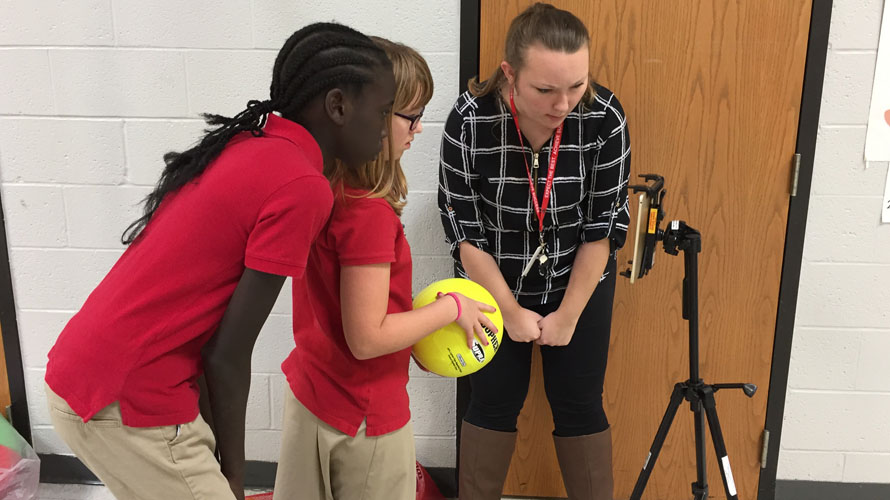Haley Haskell applies learning technologies skills in unexpected places
11/30/2018

Haley Haskell senior in elementary education watching a video with students in a physical education class at St. Cecilia School. Haskell worked with the class as part of her learning technologies minor practicum where students gain 24 hours of field experience working in a classroom. Photo by Sally Shaver DuBois
Haley Haskell has made one thing clear: she has no intention becoming a physical education teacher. However, being placed into a physical education class for her learning technologies minor practicum opened her eyes to the numerous ways that technology can help teachers across all disciplines.
A senior in elementary education and graduate of North High School in Des Moines, Haskell had seen her high school transition into using the one-to-one method, where every students gets their own laptop, tablet or other piece of technology. She had also noticed that the teachers at her school lacked the skills to use the technology effectively in their classrooms.
“I knew I wanted to be a teacher and I didn’t want to be in a school that’s one-to-one and not use it effectively,” Haskell said.
This desire to effectively use technology in teaching is the reason Haley decided to pursue a learning technologies minor. The only minor offered in the School of Education, the learning technologies program is a 16-credit minor where students learn how to use and integrate technology into their classrooms. One of the courses is the CI 280B practicum, where students complete 24 hours of field experience in a classroom.
“The minor is primarily [chosen by] elementary education, early childhood education, and secondary education students,” said Denise Crawford, assistant professor of education and director of the Center for Technology in Learning and Teaching. “It’s pretty much a pre-K through grade 12 [teacher-education] minor.”
For her practicum, Haley was placed in a physical education class at St. Cecilia, a private school in Ames. The instructor for the class, Sally Shaver DuBois, a lecturer of kinesiology, received her master’s degree from Iowa State and reached out to the program about finding a student to help out in her class.
“I’ve done some technology things in my physical education classes,” Shaver DuBois said. “I had some ideas and let her [Haley] choose what she wanted to try. We worked together on some projects and I just let her figure out the technology.”
One of the projects that Haskell worked on in Shaver DuBois’s class was using a video delay app to film students working on volleyball skills. Haskell noticed that students weren’t seeing the small mistakes they were making, and filming them offered an opportunity for students to analyze their skills and make improvements based on the video footage they were seeing.
This use of the video delays, along with the use of GIFs and videos for warm-ups have given Shaver DuBois a jump on using technology in new ways, as well as changing up her style of teaching.
“It changes my instruction up a little bit and I can engage the kids in a different way,” Shaver DuBois said.
Next semester, Haskell will be student teaching in a triad with a cooperating teacher and an engineering graduate student so she can get to know the standards for teaching engineering in area schools. Her experience at St. Cecilia has helped her develop her skills and shown her the different ways to incorporate technology across elementary school curriculums. Although Haskell focused on physical education for her practicum, she will apply those concepts to other aspects of elementary education.
“This shows Haley’s versatile thinking on how technology can be used across the pre-K through 6th grade curriculum,” Crawford said.
Key contacts
Haley Haskell, Elementary Education, hhaskell@iastate.edu, 515-314-2417
Denise Crawford, associate professor, School of Education, dschmidt@iastate.edu, 515-294-9141
Sally Shaver DuBois, lecturer, Kinesiology, sdshaver@iastate.edu., 515-294-8009
Cathy Curtis, communications director, College of Human Sciences, ccurtis@iastate.edu, 515-294-8175
Jill O’Brien, communications assistant, College of Human Sciences, jeohsci@iastate.edu,